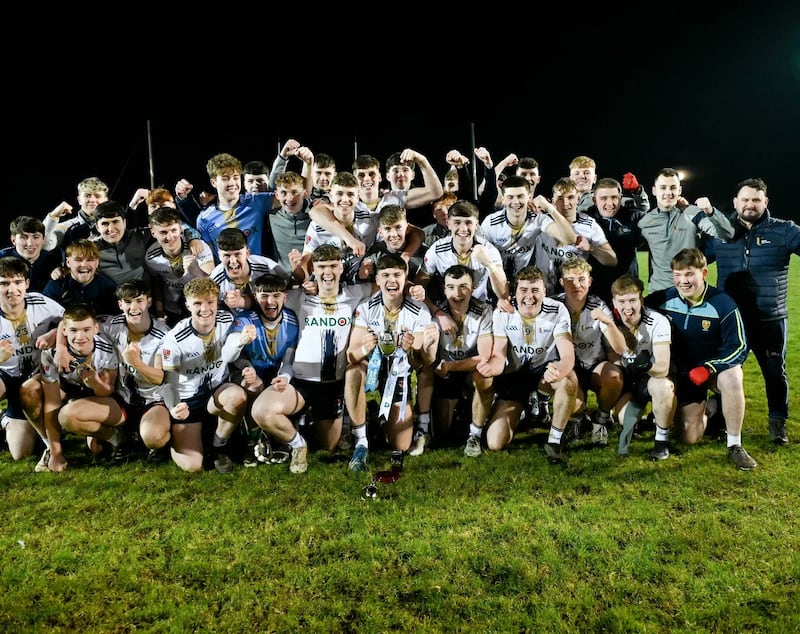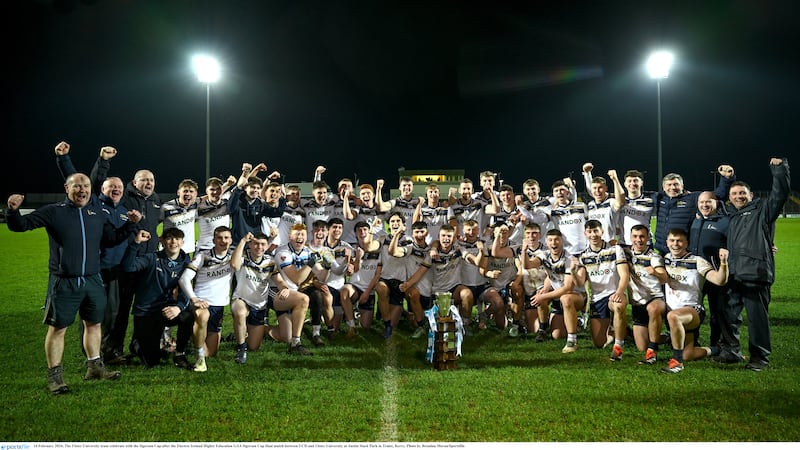IN all of this bombastic resistance to the development of Casement Park you can hear echoes of what has come before.
It has taken different forms and come in different guises, but this opposition to the GAA, this hellbent determination in some quarters to remain narrow-minded and suspicious, is really nothing new.
Take the case of Ulster University – the reigning Sigerson Cup champions – as an example.
When the charter for Jordanstown was first published in 1967, it somehow wasn’t expected that there would be any demand for Gaelic Games.
What. No-one expected it? That is hard to fathom when you consider that the GAA was absolutely flourishing in the North around that time.
Down had won the All-Ireland in 1960 and 1961 – with record crowds in attendance at Croke Park - and the Mournemen would bring the Sam Maguire across the border again in 1968.
At university level, Queen’s University had led the way by winning the Sigerson almost a decade earlier (1958) so there wasn’t just an interest in Gaelic Games, there was a proven demand.
Despite all that, the GAA wasn’t even on the radar at Ulster University.
In the early days there were three rugby fields, three soccer fields, three hockey fields at Jordanstown and no GAA pitches.
But that repression (the antithesis of what the university ethos should be) only made the GAA flourish. It’ll be the same story with Casement.
There may not have been pitches but there were players and those players formed a team and played their first games at Cherryvale in Belfast.
In 1978, Tommy Joe Farrell arrived as a student at Jordanstown.
Then, as now, he was a GAA enthusiast and he was encouraged to become secretary of the club by Brian Canavan, James Devlin and Michael Sands.
That began the chain of events that has led to the remarkable growth and development of Gaelic Games in Jordanstown since.
Nowadays ‘The Poly’ boasts excellent GAA facilities and this year the university celebrated their sixth Sigerson triumph thanks to a six-point win over UCD. Brilliant scores from Darragh and Ruairi Canavan and Niall Loughlin (1-10 between them) were at the forefront of that victory.
And that success is just the tip of the iceberg.

Underneath Sigerson Cup level, there are tons of great work taking place at Ulster University.
The Poly Freshers Thirds’ team won their All-Ireland Championship this week.
They beat DKIT 2-13 to 2-11 in a nail-biter after extra-time in Dundalk last Monday night.
There were no current county stars on the team and a whopping 57 players on the panel meaning that some excellent footballers obviously didn’t get a game or even into a matchday squad.
But whether they played or not, you would expect that the experience was valuable and enjoyable for everyone involved.
Year one students, many of whom would be living away from home and out in the big, bad world for the first time, were meeting new people, experiencing good coaching, training with good players, socialising and feeling part of something very positive.
The coaches who brought those players through from clubs all over the country and gave them the skills and confidence to get involved in the team deserve a round of applause here.
Bringing players through isn’t always easy and when a new season begins it can be difficult for coaches to get underage teams up-and-running.
A few months can make a big difference in a teenage life and since the end of the previous season some might need a bit of extra encouragement to put down the phone, leave their bedroom for a couple of hours and get their boots back on.
There is competition from other sports like basketball, rugby soccer.
As ever, the lure of discos and bars is getting ever-stronger and there is increasing pressure for homework and study etc, etc.
The ambition for a coach will always be to finish the season with more players than they started it.
It’s all about improving the group you have and trying to add to it if possible so, while it can’t be helped, when you lose a player it is always disappointing.
As much as you might like to, you can’t really argue too much with that.
All you can do is make sure he or she knows, and their parents know, that the door is always open and hope that, as the evenings grow longer, they’ll reconsider and land down at the field some sunny evening with their boots back on.
Bringing players through the ranks is the life blood of the GAA.
No club can flourish without a steady stream of well-prepared players coming up to take the places of the men and women who have gone before them.
But leaving club matters aside, there are many personal benefits for a young player even if they never kick a ball at senior level.
More than ever, the skills of Gaelic football, camogie or hurling are portable gifts that can be taken and used far away from the native sod, whether that’s to study at college or for travelling around the world.
Last summer I saw the impact the GAA can have in the USA.
For any young person who wants to travel and work, playing Gaelic Games is a very handy way to open doors and connect with people wherever they are in the world.
Parents should always have that in their mind when their child tells them they don’t want to play sport any more.
Who knows what their child might grow up to become or where life’s journey will take them and having the ability to play and appreciate Gaelic Games will always be a benefit to them which will allow them to meet and connect with people wherever they go.
So get them all back up-and-running for another year - one day they could be running out at Casement Park.






